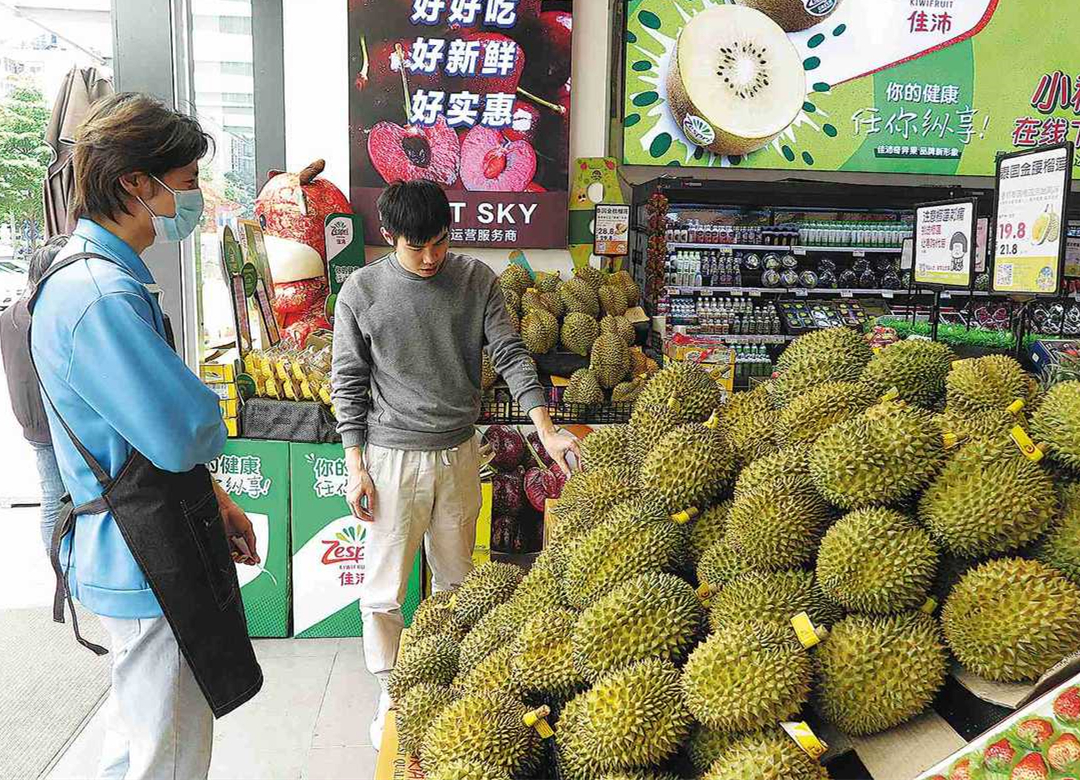Partnership set to boost cooperative exchanges
 Durian from Southeast Asian countries are seen on sale in Nanning, Guangxi Zhuang autonomous region. [Photo/Xinhua]
Durian from Southeast Asian countries are seen on sale in Nanning, Guangxi Zhuang autonomous region. [Photo/Xinhua]
The Regional Comprehensive Economic Partnership agreement, the world's largest trade deal, will create new economic and trade development opportunities among participating countries, which account for about 30 percent of global GDP, experts said.
They made the remarks at a seminar called "The RCEP takes effect: Regional economic integration and post-pandemic economic recovery and growth", which was held on Sunday on the sidelines of the RCEP Media & Think Tank Roundtable Forum.
Taking place both online and offline, the forum was organized by the Publicity Department of the Communist Party of China Hainan Provincial Committee, China Daily, the China Institute for Reform and Development and the China Institute for Free Trade Ports.
Considering the risks-including the impact of COVID-19, disruptions to global industrial and supply chains, rising commodity prices and the tight energy supply-Wang Yiming, vice-chairman of the China Center for International Economic Exchanges, said the RCEP is a landmark of regional economic integration and will boost global economic integration.
Wang said the agreement will deepen regional economic and trade cooperation, improve cooperation in industrial and supply chains and enhance vitality in the service trade sector.
The RCEP agreement was signed in 2020 by 15 countries in the Asia-Pacific region, 10 member states of the Association of Southeast Asian Nations and five of their key trading partners: China; Japan; South Korea; Australia; and New Zealand.
The agreement came into effect for 10 members-six ASEAN states plus China, Japan, Australia and New Zealand-at the start of the year. That will be followed by implementation in South Korea on Feb 1.
Citing a report released by the McKinsey Global Institute, Wang said the world has become more economically exposed to China.
"China is building a new 'dual circulation' economic development pattern, which takes the domestic market as the mainstay while domestic and foreign markets complement each other to further expand the domestic market, consumption and imports. That will create conditions for participating countries to expand their exports to China and promote regional economic and trade cooperation," Wang said.
Data from the General Administration of Customs show China's imports and exports hit $6 trillion last year. In renminbi terms, total foreign trade surged 21.4 percent from a year earlier.
During the COVID-19 pandemic, ASEAN has become China's largest trading partner, with the value of bilateral trade between China and ASEAN nations jumping by 19.7 percent last year.
Wu Hailong, president of the China Public Diplomacy Association, warned of challenges and uncertainties, such as the impact of the pandemic.
He said participating countries under the RCEP framework need to continuously promote regional cooperation, enhance regional trade and investment liberalization and facilitation, promote the development of the digital economy, drive the shift toward greener economies and strengthen exchanges in the region.
He added that the RCEP agreement coming into force will create more opportunities for China, especially the southernmost province of Hainan.
Making good use of its unique geographical advantages, free trade port policies and business environment, Hainan will benefit significantly from the RCEP, Wu added.
Wu's views were echoed by Ong Tee Keat, president of the Center for New Inclusive Asia in Malaysia, who took a rosy view of the development prospects of the cooperation between Hainan and Southeast Asian countries under the RCEP framework.
Ong, who is also a former minister of transport of Malaysia, has seen complementarity between Hainan and Southeast Asian economies in areas of the green and blue economies, such as trading in carbon credits, aquaculture, fisheries and maritime logistics.
Looking ahead, Bert Hofman, director of the East Asian Institute at the National University of Singapore, said the RCEP will play a key role in strengthening the supply chain, dealing with climate change and resolving trade disputes and conflicts among participating countries.
That view was echoed by Ahn Choong-yong, distinguished professor at the Graduate School of International Studies of Chung-Ang University in Seoul, South Korea, who said the RCEP will help ensure a more resilient supply chain to better serve participating economies.